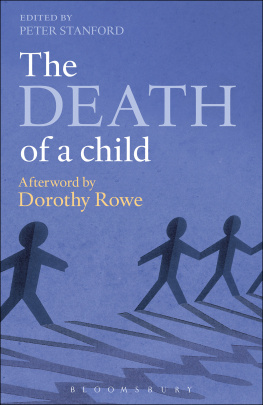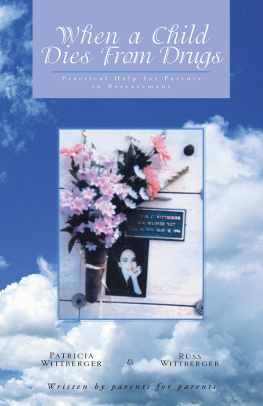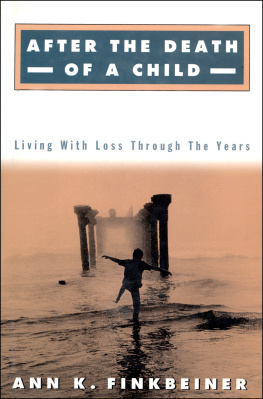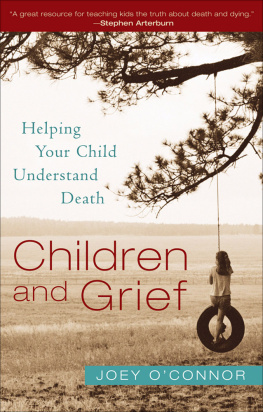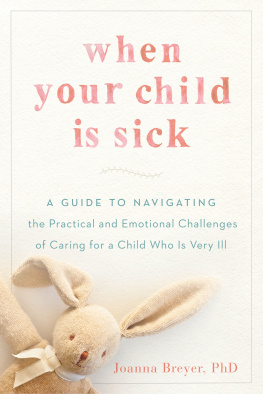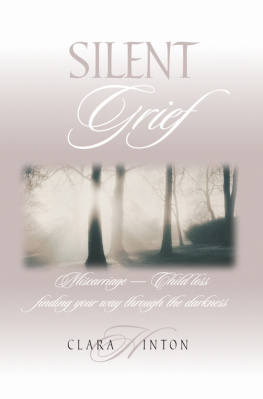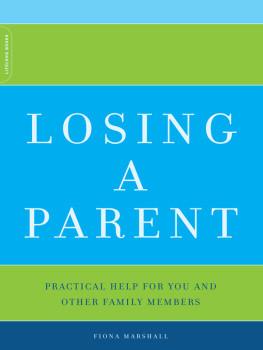THE DEATH OF A CHILD
THE DEATH
OF A CHILD
EDITED BY PETER STANFORD

Bloomsbury Academic
An imprint of Bloomsbury Publishing Plc
50 Bedford Square | 1385 Broadway |
London | New York |
WC1B 3DP | NY 10018 |
UK | USA |
www.bloomsbury.com
Bloomsbury is a registered trade mark of Bloomsbury Publishing Plc
Editorial Peter Stanford, 2011
The copyright of each essay resides with the author of that essay.
The authors have asserted their rights under the Copyright,
Designs and Patents Act, 1988, to be identified as the authors of this work.
All rights reserved. No part of this publication may be reproduced or transmitted in any form or by any means, electronic or mechanical, including photocopying, recording, or any information storage or retrieval system, without prior permission in writing from the publishers.
No responsibility for loss caused to any individual or organization acting on or refraining from action as a result of the material in this publication can be accepted by Bloomsbury or the author.
British Library Cataloguing-in-Publication Data
A catalogue record for this book is available from the British Library.
ISBN: HB: 978-1-4411-8303-3
PB: 978-1-4081-9208-5
ePUB: 978-1-4411-3618-3
ePDF: 978-1-4411-6886-3
Library of Congress Cataloging-in-Publication Data
A catalog record for this book is available from the Library of Congress
Contents
Seamus Heaney
Carol Drinkwater
Catherine Dunne
Sarah Brown
Joanna Moorhead
Mary Craig
Louise Patten
Kim Meade
Robin Baird-Smith
Barry Mizen
Richard Davenport-Hines
Augusto Odone
Wendy Perriam
Dorothy Rowe
Michael Rosen
Editors Introduction
There is a park bench on Hampstead Heath where I walk the family dog. It is on my regular circuit and however often I stop and read its simple inscription, I am always moved. Riley Arthur Paterson Croft, 25 March 2005, lived 35 minutes loved forever.
Life, most of us come to learn, has few patterns, few things that we can expect to happen, but most parents still assume that their children will outlive them. For some mothers and fathers, such as Rileys, even that is taking too much for granted. They have to face the tragedy of the death of their child. Each year in the United Kingdom almost 3,000 youngsters between the ages of 1 and 19 die as a result of illness and accident. Every year 1 baby in 100 dies before, at, or soon after birth.
In this collection of a dozen essays, those who have lost a son or daughter tell their stories in the hope that, by doing so, they may help others facing or experiencing the same bereavement. And, that they might afford insight to those of us, among families, friends and loved ones, who watch their suffering, want so fervently to be helpful and supportive, but dont quite know how.
Mothers and fathers are joined in this collection by two siblings who contribute essays on brothers or sisters who have died. They give their perspective, again with the intention that reading their words may support others in similar situations as well as to inform a wider public.
My role as editor has been a backroom one, bringing together the contributors. The credit for what follows belongs entirely to the authors: for their willingness to share something so very personal and intimate in public; for their courage in laying bare the emotional and psychological journey they and their families are still on; for their determination to celebrate the lives, however brief, of children whose futures were taken away; and for their honesty. Some write of how they have been able to go onwards and forwards with their lives after bereavement, others of their continuing struggle to cope with grief.
Each experience shared in this book is unique, but together, at varying lengths, they recall the death of much-loved and much-missed children from the loss of infants through miscarriage and stillbirth, right up to watching a fully-grown daughter with a family of her own die. They also address different circumstances, from physical or mental illness to murder and suicide.
The individual essays are followed by an Afterword on grief from psychologist and writer, Dorothy Rowe. And the collection begins and ends with poems by Seamus Heaney and Michael Rosen, both of whom have experienced the death of a child. A proportion of any royalties raised by this book will go to the Child Bereavement Charity.
Peter Stanford
London, January 2011
Mid-Term Break
Seamus Heaney
I sat all morning in the college sick bay
Counting bells knelling classes to a close.
At two oclock our neighbours drove me home.
In the porch I met my father crying
He had always taken funerals in his stride
And Big Jim Evans saying it was a hard blow.
The baby cooed and laughed and rocked the pram
When I came in, and I was embarrassed
By old men standing up to shake my hand
And tell me they were sorry for my trouble,
Whispers informed strangers I was the eldest,
Away at school, as my mother held my hand
In hers and coughed out angry tearless sighs.
At ten oclock the ambulance arrived
With the corpse, stanched and bandaged by the nurses.
Next morning I went up into the room. Snowdrops
And candles soothed the bedside; I saw him
For the first time in six weeks. Paler now,
Wearing a poppy bruise on his left temple,
He lay in the four foot box as in his cot.
No gaudy scars, the bumper knocked him clear.
A four foot box, a foot for every year.
Mid-Term Break appears in Death of a Naturalist, Seamus Heaneys award-winning 1966 collection, and in subsequent editions of his collected poems, all published by Faber and Faber. His brother, Christopher, was killed, crossing the road, in 1953 at the age of 3.
CHAPTER ONE
Carrot
Carol Drinkwater
Carol Drinkwater is an award-winning actress whose many roles include that of Helen Herriot in All Creatures Great and Small. She is also the author of childrens books and a novelist, while her memoirs, based on the olive farm where she lives in the south of France with her husband, have been international best sellers. In 1994, she miscarried a longed-for baby girl, at 21 weeks, whom she knew as Carrot.
A silent dawn is breaking on a stark, cold morning. The world north of here is blanketed in snow. I am huddled by a crackling log fire. No one else is present at our olive farm, no one except me and our trio of dogs. Soon it will be Christmas. My husband who is in China will have returned. My mother will join us, as well as Vanessa, one of my stepdaughters, one of the twin girls born to my husband and his first wife. Vanessa will be arriving with her three small children. Yes, the upcoming holidays promise a full house; a situation I enjoy greatly...
I rarely allow myself to dwell on the past. It is time ill spent. It serves nothing, in my opinion, but just occasionally, particularly during this season of Christmas lights, of family gatherings, the past creeps up on me, throwing up hoary pictures to set me off-balance.
I was in my mid-thirties and newly married to Michel, a Frenchman I had been living with for close to 3 years. Although I had made my home with him here in the south of France, I still returned regularly to England, still kept a flat in London and still worked as an actress while beginning to build a career as a writer. I was 13 weeks pregnant when the offer came in from the BBC. It was a one-off drama and mine was to be the lead female role. A fine cast was being assembled and the play was challenging. The entire piece was scheduled to be shot on location on the outskirts of Birmingham. The fee would come in handy too, Michel and I agreed, so I accepted the offer.
Next page
